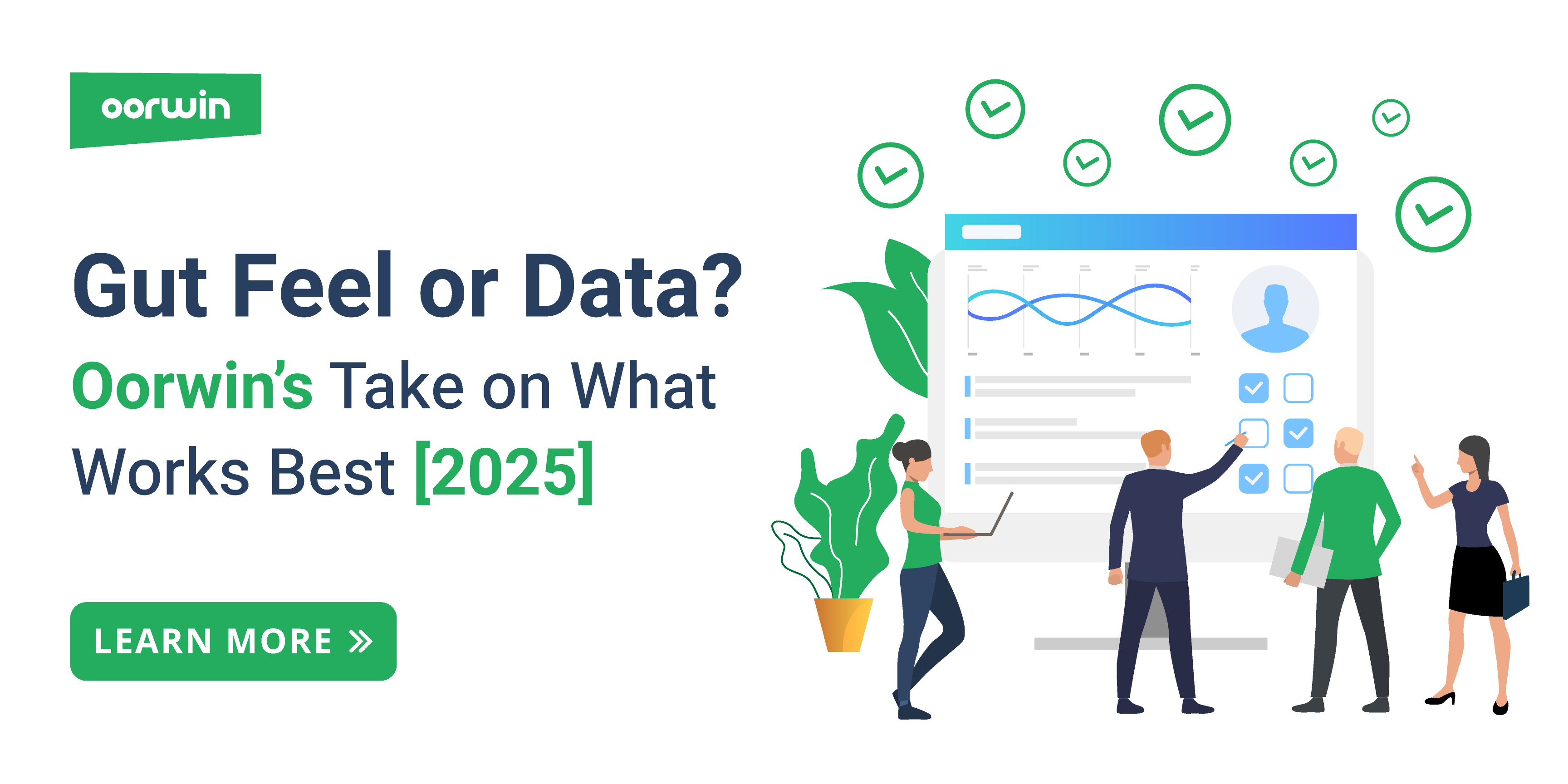Giving Helpful Interview Feedback: Tips and Strategies
Oorwin
9min read / 29 Dec 2023

Related Articles
Interview Feedback: An In Depth Guide
Interview feedback is vital for everyone involved in the interview process. If you give candidates good, solid feedback, they’re way more likely to be interested in working with you down the line. It’s not just about telling them how they did, but also giving them some pointers to get better and sharpen their skills.
On the flip side, this feedback is a big deal for employers too. It helps you make smarter choices when you’re deciding who to hire. Plus, it makes the whole interview process feel better for the candidates, which makes your company look good. Not only does this help you pull in the best talent out there, but it also keeps your current team happy and motivated.
What is Interview Feedback?
Interview feedback is like a roadmap for candidates after they’ve had an interview. It’s not just a simple “you’re in” or “you’re out.” It’s more about giving candidates a heads-up on what rocked and what maybe didn’t. It’s a blend of the good stuff and the not-so-good stuff, served up in a way that’s meant to help
The Importance of Providing Interview Feedback
In the tough job world we’re in now, giving interview feedback is extremely important. It shows that your company really cares and is dedicated to helping people grow. When candidates get feedback after an interview, they get a clear picture of how they did and what they can do better next time. This kind of open and respectful approach to hiring makes the whole process feel more honest and straightforward.
Deciding on Hiring: Assessing Candidate Fit and Competencies
When you’re giving feedback after an interview, you’ve got to look at two big things:First, figure out how well the candidate fits with your company’s culture. Are they the kind of person who’ll vibe with your team? Second, assess their skills and know-how. It’s about striking a balance in your feedback – acknowledging their strengths and also seeing if they’d really click with the way your company rolls. This approach helps you give a well-rounded view that covers both their technical skills and how they might fit in at your company.
Enhancing Candidate Performance and Career Development
Feedback after an interview isn’t just about the immediate hiring decision. It’s a stepping stone for candidates to enhance their performance and develop their careers. Constructive feedback can pinpoint areas for improvement, guiding candidates towards personal and professional growth.
Evaluating and Improving the Interview Process
When you give feedback after interviews, it’s a great chance to take a step back and look at how your interview process is working. It’s like holding up a mirror to your own methods. Are your interviews doing a good job of figuring out who’s the right fit? Are they fair to everyone? This reflective process is important because it makes sure your interview techniques are not just effective but also fair. Plus, it helps you stay up-to-date with the latest trends and standards in recruiting. By continuously evaluating and tweaking your interview process based on feedback, you can make it better and more efficient, ensuring it’s always top-notch and fair for all candidates.
Building Brand Reputation Through Constructive Feedback
How you handle interview feedback can really make a difference in how people see your company. When you give positive and helpful feedback, it paints your company in a good light. It shows that you’re not just about business but also about helping people grow. This kind of approach makes your company more appealing to potential employees. They’ll see that you value and support personal development, which can draw in even more talented folks in the future.
How to Document Interview Feedback
Documenting interview feedback is a critical step and should be handled with care. Aim for clarity and brevity in your notes, highlighting specific examples and observations from the interview. This detailed approach not only helps in delivering structured and insightful feedback to candidates but also proves invaluable for your team. It acts as a reliable resource when comparing candidates or revisiting past interviews for future hiring.
By capturing these details, you create a comprehensive record that aids in consistent and fair decision-making, ensuring a smoother hiring process in the long run. Essentially, well-documented feedback becomes a key tool for both immediate feedback and strategic hiring planning.
A Step-by-Step Guide on How to Give Constructive Feedback After an Interview: The Dos and Don’ts
Before diving into the specifics, it’s important to understand that giving constructive feedback after an interview is a delicate balance. It’s an opportunity to guide and inspire candidates, shaping their future endeavors and reflecting your company’s ethos. Here’s a breakdown of the dos and don’ts to make your feedback as effective as possible.
The Dos of Giving Job Interview Feedback
Be Genuine and Practical
When giving feedback, be honest but empathetic. Offer practical, achievable advice that the candidate can use to improve. This approach ensures the feedback is both helpful and respectful. Focus on strengths and areas for development, providing guidance that is realistic and tailored to the candidate’s performance. This helps them understand their potential and areas of growth, making the feedback a valuable tool for their professional advancement.
Focus on Behavior and Skills
Center your feedback on specific behaviors and skills observed during the interview. This objective approach ensures feedback is relevant and focused. Discuss key instances that highlight their abilities and areas where improvement is needed. By concentrating on observable actions and skills, your feedback becomes a constructive tool, providing clear insights into their performance and offering a solid foundation for future growth and refinement in their career.
Offer Actionable Suggestions
Always include practical suggestions in your feedback. This helps candidates understand their areas for improvement and provides them with clear steps for progress. Tailor these suggestions to their specific challenges and strengths, encouraging continued development and learning. This approach not only clarifies their weaknesses but also empowers them with strategies to enhance their skills, making the feedback a roadmap for improvement in future professional endeavors.
Express Appreciation for Their Effort
Recognize the candidate’s effort and dedication in preparing for and attending the interview. This acknowledgment boosts their morale and shows your company values their time and effort, regardless of the outcome. Appreciating their commitment reinforces a positive relationship, potentially encouraging future interactions. It demonstrates your company’s respect and gratitude, contributing to a positive image and encouraging a culture of mutual respect and recognition.
Maintain a Positive and Professional Tone
Ensure your feedback is delivered in a positive and professional manner. This tone helps the candidate receive the feedback constructively, fostering a respectful and supportive dialogue. A positive approach encourages candidates to view the feedback as a growth opportunity rather than criticism. Maintaining professionalism reinforces your company’s standards and values, ensuring the feedback process reflects the company’s commitment to constructive communication and employee development.
https://app.oorwin.com/signup.html?_ga=2.9140662.2077559538.1698215527-1621298368.1664513030
The Don’ts of Giving Job Interview Feedback
Don’t Provide Vague or General Feedback
Avoid giving feedback that is vague or overly general. Candidates benefit more from specific, concrete feedback that clearly identifies areas of strength and improvement. General comments can be confusing and unhelpful, lacking the detail necessary for candidates to understand their performance. Detailed feedback demonstrates that the interview process is thorough and thoughtful, ensuring candidates feel valued and respected, and providing them with clear direction for future growth.
Don’t Focus Solely on Negatives
While addressing areas of improvement is important, it’s crucial to balance this with positive observations. Highlighting strengths alongside weaknesses provides a more complete picture of the candidate’s performance. This balanced approach encourages candidates by acknowledging their capabilities, while also guiding them on how to enhance their skills. Constructive feedback that includes positive elements fosters a more receptive and motivated attitude in candidates, aiding their professional development.
Don’t Make Personal Comments
Keep your feedback strictly professional and job-related. Personal comments are inappropriate and detract from the objective nature of the feedback. Focusing on job-related skills and behaviors ensures the feedback is relevant and useful for the candidate’s professional growth. This approach maintains a respectful and professional atmosphere, avoiding any discomfort or misunderstanding, and ensuring the feedback process upholds the highest standards of professionalism and respect.
Don’t Delay Giving Feedback
Providing timely feedback is essential. Delaying feedback can diminish its effectiveness and create unnecessary stress for the candidate. Prompt feedback demonstrates efficiency and respect for the candidate’s time and effort. It ensures the candidate can quickly reflect on and learn from the experience, applying the insights to future opportunities. Timely feedback contributes to a positive candidate experience, reflecting well on your company’s recruitment practices and commitment to respectful communication.
Don’t Compare
Avoid making comparisons between candidates. Focus solely on the individual candidate’s performance and potential. This ensures feedback is personalized and relevant, offering specific insights into their unique strengths and areas for improvement. Comparisons can be unfair and unproductive, detracting from the individual’s achievements and learning opportunities. Personalized feedback respects the candidate’s individual journey and contributions, fostering a more accurate and constructive assessment of their suitability for the role.
5 Effective Interview Feedback Examples
Example #1: Constructive Feedback
“Your technical skills are quite impressive. We think boosting your communication skills would make your overall profile stronger. It’s about pairing your technical knowledge with the ability to share your ideas effectively.”
Example #2: Strengths and Improvement Areas
“You’ve got great problem-solving skills. A bit more familiarity with our specific software would make you an even better fit for roles like this. It’s about balancing your natural problem-solving ability with specific technical knowledge.”
Example #3: Feedback for Unsuccessful Candidates
“Your qualifications are impressive, but we chose someone whose experience fits our current needs more closely. This isn’t about your skills lacking, but about finding the right match for this specific role. Please consider applying for future roles that align with your expertise.”
Example #4: Problem-Solving and Analytical Skills
“Your analytical skills stand out as a strong point. Keep developing these skills, as they are crucial in our field. Whether through training or practice, enhancing these abilities will open up more career opportunities for you.”
Example #5: Presentation Skills and Confidence
“Your presentation was well-organized, but increasing your confidence when delivering could make a big difference. Practice presenting more to build this confidence. Your strong content, combined with a confident delivery, will be very effective.”
Maximize the Impact of Interview Feedback with Oorwin
Wrapping up, remember that providing interview feedback is like walking a tightrope – you need the right mix of fairness, kindness, and straightforwardness. When you nail this, your feedback becomes a valuable tool – it doesn’t just help the person who interviewed, but it also shines a positive light on your company and makes your hiring process better. Keep in mind, great feedback is key for career growth, both for the folks interviewing and for your business.
Want to up your recruitment game? Don’t forget to check out our blog for more tips and tricks. Also, have a peek at what Oorwin has in store. Oorwin makes the whole process of finding and hiring top talent smoother and smarter. So, don’t let the opportunity slip to boost your recruitment with Oorwin’s help!
FAQ
1. How do you share feedback after an interview?
To share feedback after an interview, follow these steps:
- Timing is Key: Provide feedback promptly, ideally within a few days of the interview.
- Be Specific: Offer clear, constructive comments about their performance, citing specific examples from the interview.
- Balance Positives and Negatives: Include what they did well and areas for improvement.
- Be Professional and Respectful: Deliver the feedback in a kind and professional manner.
- Offer Actionable Advice: Suggest ways the candidate can improve or resources they can use.
2. What are good interview feedback examples?
- Positive Feedback: “Your knowledge in [specific area] was impressive, and your examples clearly demonstrated your skills.”
- Constructive Feedback: “While your technical skills are strong, showing more examples of teamwork or collaboration could strengthen your interview.”
- General Feedback: “You communicated your ideas effectively. For future interviews, consider elaborating more on your problem-solving strategies.”
3. Can providing interview feedback benefit the company’s brand?
Yes, providing interview feedback can significantly benefit a company’s brand:
- Improves Candidate Experience: Positive interview experiences can lead to candidates spreading good word-of-mouth about the company.
- Builds Reputation: Companies known for giving constructive feedback are often viewed as caring and professional.
- Attracts Talent: A good reputation can attract high-quality candidates who value transparency and growth.
- Encourages Improvement: Feedback helps candidates improve, potentially making them a better fit for future roles in the company.
Popular Articles..
Blog

8min read / 25-Jun-2025
Master Effective Interview Techniques with Oorwin: A Step-by-Step Recruiter’s Guide
Blog
Blog
Get the latest Oorwin releases, updates, success stories & industry news
 Back
Back


